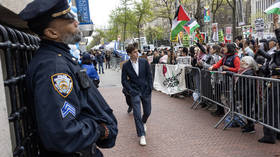The Dr. Strange of the American Revolution
nautil.us
Brian Gallagher

“I ascribe the Success of our Revolution to a Galaxy,” Benjamin Rush wrote to John Adams, in 1812. He wasn’t invoking the astrological. It was commonplace then to associate a bright assembly of people with the starry band in the night sky that Chaucer called “the Milky Wey.” Yet Rush crossed out “a Galaxy” and wrote in, perhaps for the sake of specificity, “an Illustrious band of Statesmen—philosophers—patriots & heroes.” Historian Jill Lepore has written that, in the “comic-book version of history that serves as our national heritage, where the Founding Fathers are like the Hanna-Barbera Super Friends, Paine is Aquaman to Washington’s Superman and Jefferson’s Batman.” And Rush? I posed this question to Stephen Fried, author of the recent book, Rush: Revolution, Madness & the Visionary Doctor Who Became a Founding Father. Fried replied, “Dr. Strange.”
An apt choice. Rush was a strange, or a strangely gifted, man, and one of the youngest—at 30—to sign the Declaration of Independence. Mentored by his fellow Philadelphian Founding Father Benjamin Franklin, Rush would become a towering intellect with a remarkable admixture of passions. In his twenties, politics was a minor one—medicine and chemistry were his strong callings—but a quiet association he maintained with the Philadelphia Sons of Liberty turned fateful when, one summer day in 1774, he was invited to join in the welcoming of the delegations for the first Continental Congress. He would make lasting impressions on Washington and Adams, among others, participating in conversations, some he hosted at his home, of fervid patriotism, cross-pollinating ideas of how to advance the revolution. It would lead Rush to task Thomas Paine with writing, and he editing, what would be called Common Sense, an anti-monarchical and pro-Independence pamphlet.
During the Revolutionary period and afterward, Rush was one of the most preeminent physician-scientists alive (Rush University Medical Center, in Chicago, is named after him). He lent his fierce pen to a variety of social causes, among them emancipation for America’s slaves and rigorous education for girls and women. Though a Christian, Rush was religiously tolerant of all faiths and a champion of secularism. He encouraged Thomas Jefferson to finish what would become the Jefferson Bible, a non-supernatural reworking of the Old and New Testaments. In Rush, Fried confirms what earlier biographical writings on the doctor had observed: that history misunderstood him, “had not taken him seriously enough as a founder, a writer, a teacher, and a revolutionary in politics, medicine, religion, public health, and philosophy.”
Rush was a founder of American psychiatry. As a scientist, he was fascinated by mental illness; as a doctor, he was horrified by its treatment. Where most saw the workings of God or demons in the manners of the mentally ill, Rush saw malfunctioning parts. It was no sin to be deranged. The mentally afflicted deserved sympathy and sophisticated care. They had “diseases of the brain,” he said, not character flaws of failures of will. Rush was a pioneer in removing psychiatric patients from prison conditions. He unchained them, gave them proper lighting, and had them exercise in the hospital gardens.
One of Rush’s first psychiatric cases, in the 1780s, involved Philadelphia’s most publicly mad woman, an old widower named Hannah Garrett who harbored royal delusions and made a habit of catching flying insects and dismembering them. She’d keep their bodies in a jar “for the presumption of daring to bite the King’s daughter.” Rush diagnosed her with a “grief-induced madness” triggered, in middle life, “by the loss of her husband.” Rush and his staff, as part of her treatment, regularly spoke to her, to try to understand what Rush viewed as her “errors of thinking” in order to heal her.
In 1786, the American Philosophical Society relaunched its annual oration—an occasion for a sterling lecture on a matter of importance—and wanted Rush to give it, in Philadelphia. The city was, at the time, the site of an American Enlightenment. Some of the country’s brightest minds would attend Rush’s talk. Newspapers advertised the event; a thousand tickets were printed. “The subject of the lecture was not announced,” Fried writes. “Dr. Rush himself was the draw.” He knew that nearly everything he’d say would amount to blasphemy for someone he respected, because his subject was “An enquiry into the influence of physical causes on the moral faculty,” the moral faculty being the “power in the human mind of distinguishing and choosing good and evil…virtue or vice.”



